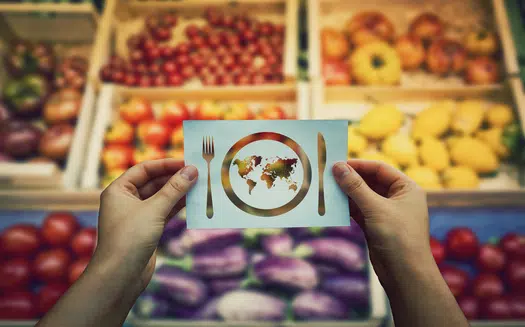
Global hunger issue, water supply problem. Hands holding a paper sheet with world map in a plate with knife and fork icon over market shelves background. International craving and starvation metaphor.
The United States recently rejoined the Paris climate agreement, a move that followed the Biden administration’s immediate pledges to focus on reducing carbon emissions.
One expert said such efforts could provide a key benefit beyond air quality. Kristie Ebi, professor of global health and environment at the University of Washington, said that’s not only good for the environment; it could also help secure the world’s food supply. A changing climate means more heatwaves and floods, but Ebi added rising carbon dioxide levels will also make food less nourishing.
“Experiments putting plants out under higher concentrations of carbon dioxide show that as we have even higher concentrations of carbon dioxide in the atmosphere, the nutritional density of major cereal crops declines,” Ebi explained. Ebi noted the studies were done on wheat and rice, the crops that provide the largest proportion of calories around the world.
The warming climate will also affect crop yields.
About 9% of the global population is food insecure. In Wisconsin, various government agencies and environmental groups have sounded the alarm on extreme weather events and their effect on agriculture. Ebi pointed out with the U.S. rejoining the Paris Agreement, federal agencies such as the Department of Agriculture can focus on climate change again.
“[It] will provide the support, human and financial resources, that are needed for the U.S. to understand the magnitude and pattern of shifts and to identify approaches to protect our own citizens, as well as citizens in other countries,” Ebi contended.
Historically, the U.S. is responsible for a quarter of the world’s carbon dioxide emissions. Ebi emphasized organizations are researching how to make crops more resilient to climate change, but more needs to be done. “There’s lots of opportunity for innovation in this space to start thinking of how we can organize our agricultural sector a bit differently so it produces fewer greenhouse gases and the food that’s produced is of higher quality,” Ebi concluded.










